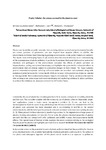Plastic pollution: the science we need for the planet we want
| dc.contributor.author | Courtene-Jones, Winnie | |
| dc.contributor.author | Clark, Nathaniel | |
| dc.contributor.author | Thompson, Richard | |
| dc.date.accessioned | 2023-01-24T13:39:36Z | |
| dc.date.issued | 2022-12-01 | |
| dc.identifier.issn | 2397-8554 | |
| dc.identifier.issn | 2397-8562 | |
| dc.identifier.uri | http://hdl.handle.net/10026.1/20199 | |
| dc.description.abstract |
Plastics are incredibly versatile materials that can bring diverse societal and environmental benefit, yet current practices of production, use and disposal have negative effects on wildlife, the environment and human health leading to growing concern across public, policy makers and industry. This Special Issue in Emerging Topics in Life Sciences describes recent advances in our understanding of the consequences of plastic pollution. In particular, it examines their potential to act as vectors for chemicals and pathogens in the environment; evaluates the effects of plastic pollution on biogeochemical cycling, ecosystem functioning and highlights the potential for enhanced effects in environments that are already subject to substantive changes in their climate. The impacts plastics pose to terrestrial ecosystems including soil communities are described and evaluated, along with evidence of potential issues for human health. With an increase in the production of plastics labelled as ‘biodegradable’ their context and ecological impacts are reviewed. Finally, we discuss the need to take an integrative, system approach when developing and evaluating solutions to plastic pollution, to achieve the ambitious yet necessary aims of the UN Plastics Treaty. | |
| dc.format.extent | 333-337 | |
| dc.format.medium | ||
| dc.language | en | |
| dc.language.iso | eng | |
| dc.publisher | Portland Press Ltd. | |
| dc.subject | ecotoxicology | |
| dc.subject | impacts of plastic | |
| dc.subject | marine plastic | |
| dc.subject | microplastic | |
| dc.subject | Humans | |
| dc.subject | Ecosystem | |
| dc.subject | Environmental Pollution | |
| dc.subject | Industry | |
| dc.subject | Planets | |
| dc.subject | Plastics | |
| dc.title | Plastic pollution: the science we need for the planet we want | |
| dc.type | journal-article | |
| dc.type | Journal Article | |
| dc.type | Review | |
| dc.type | Research Support, Non-U.S. Gov't | |
| plymouth.author-url | https://www.ncbi.nlm.nih.gov/pubmed/36453917 | |
| plymouth.issue | 4 | |
| plymouth.volume | 6 | |
| plymouth.publication-status | Published | |
| plymouth.journal | Emerging Topics in Life Sciences | |
| dc.identifier.doi | 10.1042/etls20220019 | |
| plymouth.organisational-group | /Plymouth | |
| plymouth.organisational-group | /Plymouth/Faculty of Science and Engineering | |
| plymouth.organisational-group | /Plymouth/Faculty of Science and Engineering/School of Biological and Marine Sciences | |
| plymouth.organisational-group | /Plymouth/REF 2021 Researchers by UoA | |
| plymouth.organisational-group | /Plymouth/REF 2021 Researchers by UoA/UoA07 Earth Systems and Environmental Sciences | |
| plymouth.organisational-group | /Plymouth/Research Groups | |
| plymouth.organisational-group | /Plymouth/Research Groups/Marine Institute | |
| plymouth.organisational-group | /Plymouth/Users by role | |
| plymouth.organisational-group | /Plymouth/Users by role/Academics | |
| plymouth.organisational-group | /Plymouth/Users by role/Researchers in ResearchFish submission | |
| dc.publisher.place | England | |
| dcterms.dateAccepted | 2022-11-16 | |
| dc.rights.embargodate | 2023-12-1 | |
| dc.identifier.eissn | 2397-8562 | |
| dc.rights.embargoperiod | Not known | |
| rioxxterms.versionofrecord | 10.1042/etls20220019 | |
| rioxxterms.licenseref.uri | http://www.rioxx.net/licenses/all-rights-reserved | |
| rioxxterms.licenseref.startdate | 2022-12-01 | |
| rioxxterms.type | Journal Article/Review |


